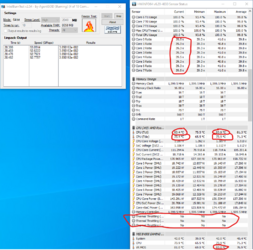- Joined
- Dec 27, 2008
Woomack, let me check to see if I am understanding you correctly. What I hear you saying is that:
1. There is a 20c temp offset that AMD has built into Ryzen 1 and 2. So are you talking about the difference between Tctl and Tdie? [As you can see from my attached pics, HWInfo64 indicates that there is a 10c offset (Tctl vs. Tdie). My understanding is that different models of Ryzen CPUs accross the generations have different amounts of fan curve offset, ranging from 0c to 20c. I'm running the 2700x.]
2. There is thermal throttling that takes place at around the 75c mark with Ryzen 1 and 2 because the actual temp is 95c due to the temp offset. [Is this why my core speed multiplier drops down from 4.35x to 39.5x under load as can be seen in the pics? Yet, what is curious to me is that HWINfo64 does not report any thermal throttling and it doesn't even when I drive temps up to over 90c. Is this not thermal throttling or is AMD defining thermal throttling in a different way?]
1. There is a 20c temp offset that AMD has built into Ryzen 1 and 2. So are you talking about the difference between Tctl and Tdie? [As you can see from my attached pics, HWInfo64 indicates that there is a 10c offset (Tctl vs. Tdie). My understanding is that different models of Ryzen CPUs accross the generations have different amounts of fan curve offset, ranging from 0c to 20c. I'm running the 2700x.]
2. There is thermal throttling that takes place at around the 75c mark with Ryzen 1 and 2 because the actual temp is 95c due to the temp offset. [Is this why my core speed multiplier drops down from 4.35x to 39.5x under load as can be seen in the pics? Yet, what is curious to me is that HWINfo64 does not report any thermal throttling and it doesn't even when I drive temps up to over 90c. Is this not thermal throttling or is AMD defining thermal throttling in a different way?]
Attachments
Last edited:
